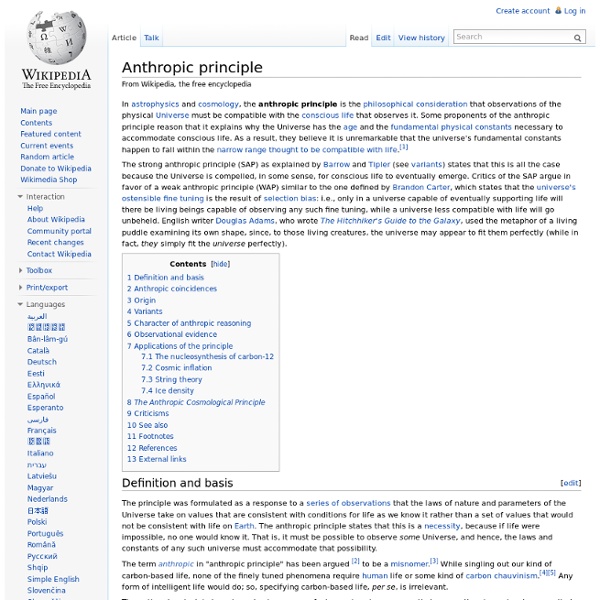



http://en.wikipedia.org/wiki/Anthropic_principle
Related: PhilosophyTheosophy article: "The Life Principle" by Blavatsky A FEW years back a very interesting controversy raged between several scientists of reputation. Some of these held that spontaneous generation was a fact in nature, whilst others proved the contrary; to the effect that, as far as experiments went, there was found to be biogenesis, or generation of life from previously existing life, and never the production of any form of life from non-living matter. An erroneous assumption was made in the first instance that heat, equal to the boiling point of water, destroyed all life organisms; but by taking hermetically sealed vessels containing infusions, and subjecting them to such or a greater degree of heat, it was shown that living organisms did appear even after the application of so much heat. Along with the fact of biogenesis, we must note, however, Mr. Tracing life downwards we ultimately reach "protoplasm," called by Huxley "the physical basis of life," a colourless, jelly-like substance, absolutely homogeneous without parts or structure.
John David Barrow Da Wikipedia, l'enciclopedia libera. John David Barrow (Londra, 29 novembre 1952) è un cosmologo inglese, professore di matematica all'Università di Cambridge. Biografia[modifica | modifica sorgente] Nel 2006 è stato insignito del Premio Templeton per "i suoi scritti sulla relazione tra la vita e l'universo, e sulla natura della consapevolezza umana [che] ha prodotto nuove prospettive sulle questioni centrali riguardo alla scienza e alla religione". Per il teatro ha scritto lo spettacolo Infinities (2002) che ha esordito al Teatro Piccolo di Milano, poi a Valencia, conseguendo il Premio teatrale Ubu 2002 come spettacolo dell'anno.
Il principio antropico - torinoscienza.it Finalmente la casa editrice Adelphi, che già in passato si è dimostrata particolarmente sensibile ai temi proposti dal cosmologo Barrow (è possibile trovare nel catlogo Adelphi altri suoi titoli dal "sapore" più o meno antropico come , e ), affronta l'impresa che di sicuro ha un forte valore storico. Infatti la sua pubblicazione costituisce uno degli ultimi, ma forse ancora possibili, casi di culturale che, in quanto tale, guida l'ardito lettore attraverso tutti gli aspetti più importanti del nostro sapere rivisitati alla luce di questo principio. Un'operazione senz'altro onesta in quanto, se di paradigma si tratta, deve comunque risultare applicabile all'astrofisica, alla biologia, alla meccanica quantistica, per citare solo alcuni degli ambiti con i quali si sono misurati gli autori fra le pagine del libro, nel tentativo di mostrare la consistenza di una visione del mondo che tenta di restituire all'uomo una posizione centrale nel progetto cosmico. Il giornale di Astronomia
The Strength of Social Media's Weak Ties In my meanderings yesterday, I happened across this interesting post on Noah Brier’s blog. Here he mentioned "the strength of weak ties" in relation to social media (and a link to a PDF). I was fascinated immediately by the title and wanted to learn more. Interestingly enough, this must be a promiscuous idea, as I had already written a draft on this exact topic some weeks ago but didn’t realise it until I did a picture search for "granovetter diagrams". 7 Questions to Assess Your Business Model Design Ultimately, customers are the only relevant judges of your business model. However, even before you test your model in the market, you can assess its design with 7 questions that go well beyond the conventional focus on products and market segments. First things first. In order to assess your business model you should sketch it out on the Business Model Canvas outlined in the video below. If you want to know more about the Canvas and how to use it you can read Business Model Generation of which 70 pages are available for free on our website. Assessing the basics
Future-proofing needs collaboration, innovation, education and inspiration Make no mistake, the transformation from a firm of the past to a firm of the future is challenging, especially while operating amid of a perfect storm of social, economic and environmental volatility. Successful transformation requires courage, not fear. The more we understand and explore our own business environments and wider business ecosystems (as well as our own inner motives and values) the more we find pathways for success – learning through doing, growth through experience, success through failure. Looking around us in nature and human nature, we find enablers to assist us; catalysts which aid and optimise the transformational journey.
Topologia Da Wikipedia, l'enciclopedia libera. Storia[modifica | modifica wikitesto] I sette ponti di Königsberg, uno dei primi problemi topologici L'antenata della topologia è la geometria antica. L'articolo di Eulero del 1736 sui Sette ponti di Königsberg [1] è visto come uno dei primi risultati che non dipendono da alcun tipo di misura, vale a dire uno dei primi risultati topologici. eduMOOC: Online Learning Today... and Tomorrow Program and Resources Expanding Daily!Visit Often for Updates! The gadget spec URL could not be found The Center for Online Learning, Research and Service at the University of Illinois Springfield welcomes you to a Massive Open Online Class (MOOC) on “Online Learning Today...and Tomorrow.”
Il Nostro Approccio Presentazione approfondita del Framework di The Natural Step Se hai già familiarità con il concetto di sostenibilità e con il Framework di The Natural Step e stai cercando degli approfondimenti, sei nel posto giusto. Il Framework di the Natural Step rappresenta l’applicazione pratica di un modello a 5 livelli per lo sviluppo sostenibile strategico. The Natural Step da più di vent’anni si è resa conto che, per evitare di perdersi nei dettagli dei singoli problemi di natura ambientale, sociale ed economica, è necessario assumere una prospettiva che consenta di vedere l’intero sistema dall’alto, il nostro pianeta (si veda la metafora dell’albero che spiega il concetto di pensiero sistemico). Il consenso scientifico sulla prospettiva di alto livello del nostro sistema (la società umana all’interno della biosfera), permette di identificare le condizioni che definiscono il successo nel nostro sistema.